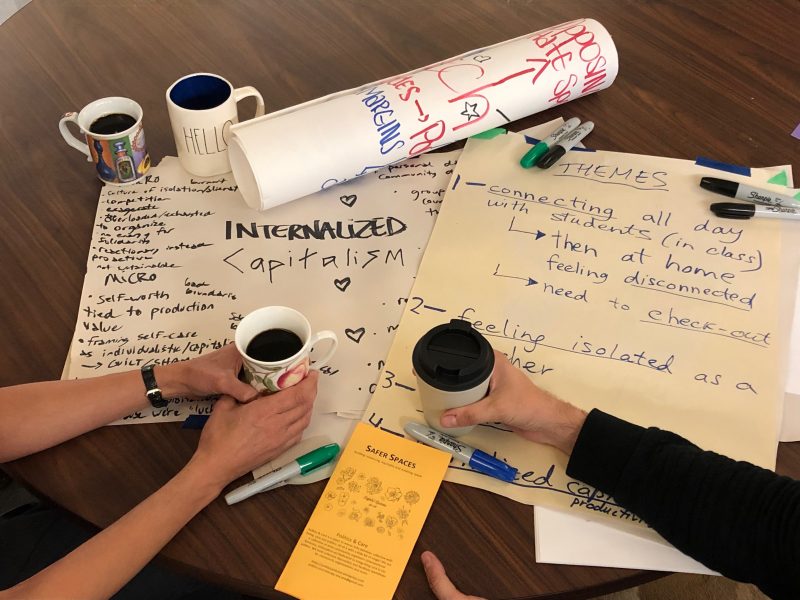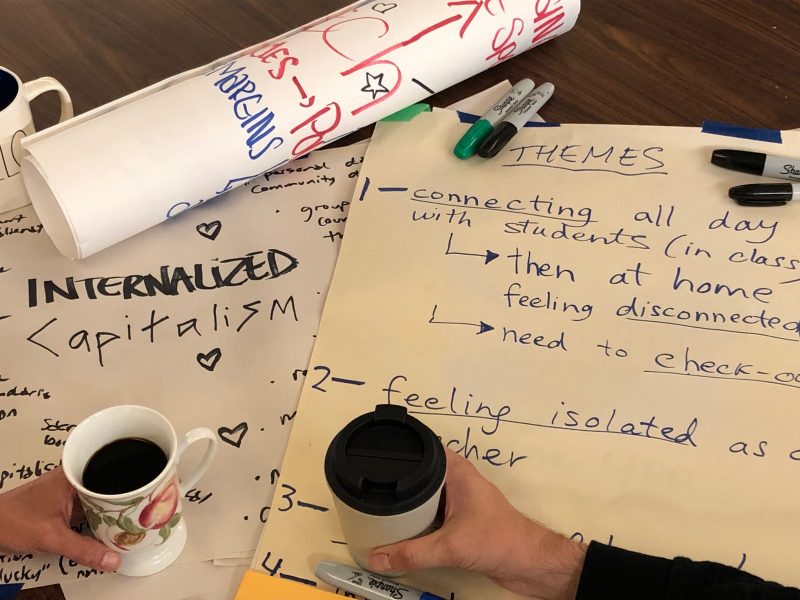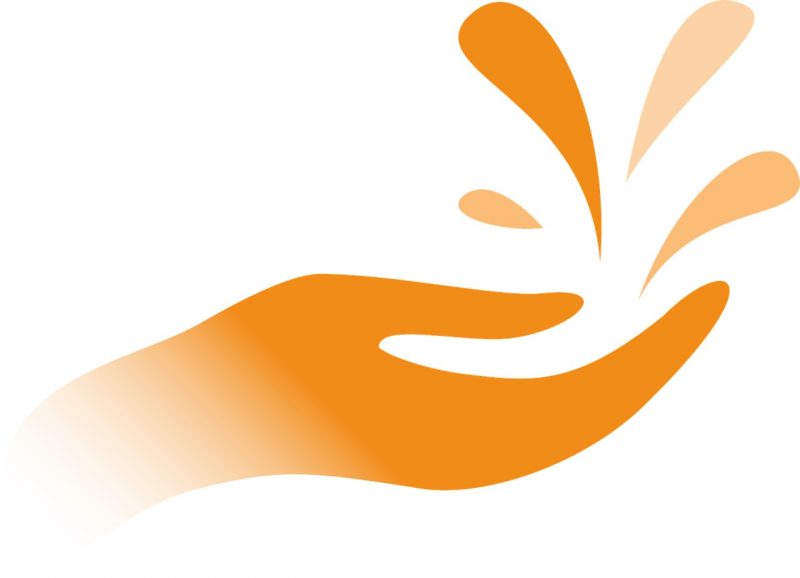Dawson has strategically taken an increasingly active role in nurturing a culture of positive psychology and mental health practice among its employees. Exploring resilience and engagement for faculty, professionals and staff, the community has made forward strides with the view that “collective teacher efficacy greatly impacts student achievement” (Hattie, 2012).
From self to collective, how do we find care in a “burnout culture”?
 Inspired by Rushdia Mehreen’s workshop “From Self to Collective: Finding Care in a ‘Burnout Culture’” – offered as one of the Outside the Box conversations at New School in the winter of 2018 – Dawson teachers launched a community of practice on Collective Care for the Teaching Community. Meeting once a month over tea, coffee and snacks, faculty members explore burnout and teaching, and move from conversations about self-care to ones about collective care and well-being.
Inspired by Rushdia Mehreen’s workshop “From Self to Collective: Finding Care in a ‘Burnout Culture’” – offered as one of the Outside the Box conversations at New School in the winter of 2018 – Dawson teachers launched a community of practice on Collective Care for the Teaching Community. Meeting once a month over tea, coffee and snacks, faculty members explore burnout and teaching, and move from conversations about self-care to ones about collective care and well-being.
Some of the questions that drive the conversations, activities and play are:
- What impact does the culture of productivity and the pressure to perform (internalized capitalism) have on us as educators?
- How does the emotional labour associated with teaching (a profession often exhausting, although satisfying) weigh down on us?
- How do educators deal with the feeling of isolation given that teaching is a relatively individualized profession?
- How do we deal with the intersection of our life outside of school (and its attendant challenges) with what happens in the classroom, and the emotions that arise there? Is there a space for our feelings in the college?
- How can we create spaces where teachers can support each other, share concrete material and find solidarity with each other?
- What strategies can we use to nurture and equip ourselves collectively so that we can continue to do social justice work, without being burned out, forced to take time away or pushed to leave our educational professions altogether?
A workshop is scheduled Friday October 25, 2019, at 2 p.m. to reach out to new people interested in collective care. Please see the end of this article for complete details.
This group is open to other CEGEPs, and our community has included faculty and professional staff from Vanier and Champlain. For more information, please contact Cory Legassic or Mari Heywood at Dawson College.
 In a related but separate activity, ten members of the faculty and professional staff at Dawson attended the annual conference of the Leadership Committee for English Education in Quebec (LCEEQ) themed “Well-Being / Being Well” in February 2019. Drawing connections between the community of practice and the value of “well-being for all,” as articulated in Dawson’s Strategic Plan, some of the participants from LCEEQ 2019 offered their reflections on the conference:
In a related but separate activity, ten members of the faculty and professional staff at Dawson attended the annual conference of the Leadership Committee for English Education in Quebec (LCEEQ) themed “Well-Being / Being Well” in February 2019. Drawing connections between the community of practice and the value of “well-being for all,” as articulated in Dawson’s Strategic Plan, some of the participants from LCEEQ 2019 offered their reflections on the conference:
Physical literacy implies physical competence as well as cognitive skills such as competence, confidence, motivation and comprehension.
I really enjoyed attending the “Well-Being” conference and found it to be very relevant and practical, particularly the presentation of different resources that promote resilience in both faculty and students. The mindfulness sessions introduced a variety of techniques that I have implemented in my classes. These include: mini moments, mini pauses, body scan sessions and breathing exercises. I encourage my students to be mindful of their eating habits, their actions and their responses to stressors. We take the time to reflect on the global meaning and practices of wellness, physical literacy and mental health. Cathy Nickson (Physical Education)
I took away great nuggets of information on the topics of resilience, self-regulation, mindfulness, connectedness and building positive mental health. Michael Ungar’s keynote address, “Resilience at Home and on the Job,” focussed on understanding resilience as it relates to relationships between individuals (faculty and students) and their school, family communities and workplaces. Jean Clinton demonstrated her mantra of the “whole child view” in building physical, cognitive, emotional and social aspects in order to develop a positive identity and build meaningful learning experiences at all levels of education. Diana Serafini (Business administration)
The 2019 LCEEQ conference highlighted how important caring and language are in the classroom. Simple things like changing labels from “students at-risk” or “struggling students” to “at-promise” helps educators reframe how we support student success. The conference also highlighted the concepts of resilience and how to develop individuals who will be capable of navigating the demands of college education. These two concepts are ones that our program faces daily so I was happy to share those strategies with my colleagues. Anne-Marie Legault (Interior Design)
Recognizing the educational pertinence of the “well-being” theme, the organizers of the LCEEQ conference in 2020 have chosen a similar theme: “Being even Better”. For more information, please contact Azra Khan in the Human Resources Department.
Upcoming Event
“Collective care & mutual support in a ‘Burnout Culture’”
Friday October 25th, 2019 (2-5 p.m., in the Colab)
This workshop carves a space for care, comfort and trust for teachers to discuss how they are doing and feeling. Teachers yield to various pressures in their everyday work from being productive to efficient at all times regardless of the situations in their personal lives. In addition to workload and classroom management, masking of anxieties and dealing with other challenges are supposed to be part of a teacher’s “toolkit”. Given the pressures and demands of the profession a number of teachers burnout in a given year and quite a few barely manage to stay afloat. Many refer to this as a “burnout culture” where burnout is not a matter of if but when.
The workshop will be a space to reflect upon: what spaces and occasions do we have or can we carve to support each other, emotionally or otherwise given the isolating nature of teaching experience; how can we extend “same boat” solidarity to each other and collectivize the concerns in order to promote healthy and sustainable teaching community; what practices of care, both self and collective, can we put in place to survive and thrive given current realities?
RSVP at https://forms.gle/B8kBsnLrrEWYmKCP6
References
Hattie, J. (2012). Visible learning for teachers: Maximizing impact on learning. London: Routledge.



